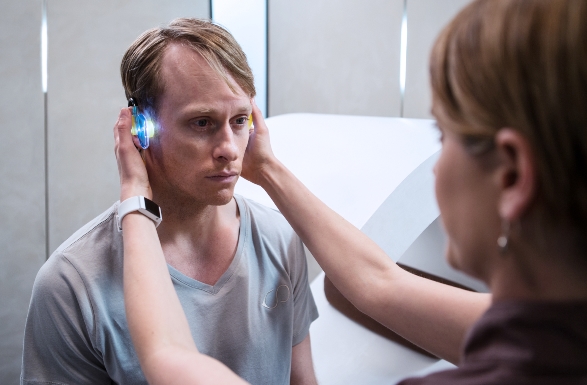Restoration (Photo credit: Jeff Paine).
Sci-fi thriller Restoration recently aired on the Nine Network and is currently streaming on Stan.
Shot at Docklands and on location around Melbourne, the film is set in a near-future world where humans are able to have their memories downloaded and backed up.
Oliver Klein (Grant Cartwright, Barracuda) wakes up after a routine backup with his memories restored into the body of another man (Steve Carracher, Vanished).
Restoration also stars Craig McLachlan (The Doctor Blake Mysteries), Nadia Townsend (Knowing, City Homicide), Rosie Lourde (Starting From Now, Embedded) and Elizabeth Nabben (Winners & Losers).
The film was directed by Stuart Willis, who co-wrote the screenplay with Matthew Clayfield. Willis told IF the idea was inspired by the ubiquity of smartphones and cloud technology, and influenced by the extended periods that both writers often spend away from home for work.
“There’s always that moment when you come home… where you kind of feel like a stranger in your own house, a stranger to your partner and sometimes to yourself,” Willis said.
Toby Gibson, who independently produced Restoration through Midnight Snack Productions, said he’s thrilled with the broad local exposure from the multi-platform launch.
As well as what he calls the “traditional living room” experience on 9Go, Gibson said that the longer viewing window afforded through a streaming release on Stan means that “people are more likely to give it a punt.” Restoration has also been picked up Virgin Australia for domestic and international flights.
“The goal was not to corner ourselves into one release strategy, but to have a complementary release strategy that spoke to all forms of viewership at the moment,” he told IF. “I think we got all bites of the pie, if you like, which is great.”
Gibson said the focus is now on capturing a international audience for the film. Restoration doesn’t necessarily have to be sold to other markets in its current format (a 50 minute feature). The film was originally slated as a webseries and still works as such, Gibson said.
The producer is offering the film as a 5-part, 10 minute series to prospective markets overseas, or two half hour series and a standalone featurette.
“We like to consider it flexible storytelling,” said Gibson. “These days there are so many different formats and devices you can watch things on… I think it’s important you look at catering to those different needs.”
Willis said he always wanted Restoration to reach an online audience, after the “incredible response” he received after uploading his VCA graduating film, Payload – also a sci-fi – online following a festival run in 2012. The online release offered up a wider audience and a dialogue that wasn’t necessarily possible through a festival, he said.
“A festival's a cinematic experience, but it feels like online is more of a conversation. So we knew [that] whatever we do next, there’s a very committed online audience for science fiction and that we should speak to them,” he told IF.
“That’s why the original idea was: let’s do [Restoration] as [an online] miniseries. That eventually grew into something that was perfect for SVOD.”
According to Willis, SVOD is starting to change people’s perceptions of what content can be, and has lifted some of the constraints that have traditionally existed around length on the web – noting Restoration’s “unusual” 50 minute runtime.
“When I was talking to people about [the] web-series in 2009, there was this perception that they were only five minute episodes – it was like ‘no one’s going to watch more than five minutes online',” he said. “Now there’s Stranger Things, House of Cards, Wolf Creek – they’re web series. That’s what they are. The broadcast is a very secondary consideration to them. So it felt natural for us, within Australia, to go with Stan.”
The structure of SVOD platforms means that they are better placed to take a risk and cater for niche audiences, said Willis, offering independent and genre filmmakers a new, specific audience to aim for – an appealing option given that genre doesn’t always perform well on the traditional festival circuit.
The team are now looking to turn the concept behind Restoration into longform series – provisionally titled Reversion.
“Once you start getting into this idea that your sense of identity and memory is separate from your body, there’s a lot of interesting stuff to explore,” said Willis.


